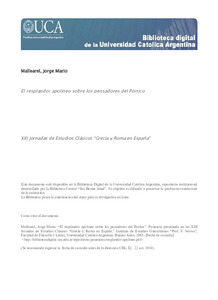Please use this identifier to cite or link to this item:
https://repositorio.uca.edu.ar/handle/123456789/3858| Título: | El resplandor apolíneo sobre los pensadores del Pórtico | Autor: | Mallearel, Jorge Mario | Otros colaboradores: | Jornadas de Estudios Clásicos (13ª : 2005 : Buenos Aires) Universidad Católica Argentina. Facultad de Filosofía y Letras |
Palabras clave: | FILOSOFIA GRIEGA; MITOLOGIA GRIEGA; ESTOICISMO | Fecha de publicación: | 2005 | Editorial: | Universidad Católica Argentina | Cita: | Mallearel, Jorge Mario. El resplandor apolíneo sobre los pensadores del Pórtico. Ponencia presentada en las Jornadas de Estudios Clásicos, Instituto de Estudios Grecolatinos "Prof. F. Nóvoa", Facultad de Filosofía y Letras, Universidad Católica Argentina. Buenos Aires, 2005. Disponible en: https://repositorio.uca.edu.ar/handle/123456789/3858 | Resumen: | Nuestra propuesta estará centrada en desandar el camino emprendido por la religiosidad apolínea en relación con un movimiento filosófico de la época helenística, nos referimos a los estoicos. Walter Otto escribe en su libro Los dioses de Grecia: “... ninguna imagen de lo viviente es completa sin lo divino”.1 Partiendo de esta afirmación, indagaremos acerca de la influencia ejercida sobre el mundo humano por el dios Apolo, figura emblemática del panteón olímpico griego. Dicho dios de la luminosidad, hijo y mensajero de su padre, Zeus, fue enviado para comunicarle a la raza de los mortales su “puesto en el cosmos”, exhortándola al mantenimiento de la norma, la medida y el equilibrio. Tal tarea obligará al hombre a conocer sus propios límites. Por lo tanto, a partir de las mencionadas características, trataremos de corroborar si ellas aparecen representadas en la filosofía estoica, nacida de Zenón de Citio. Our propose will be centralized on construct the relation between the apolinean religion and the philosophical movement of the helenistic century, the Stoicism. Walter Otto had writed on his book Die Götter Grieschenlands: “... no image of the Living is complete without the Divine”. Following up this affirmation, we will search about the influence practice over the Human race for Apolo God, one of the most important figure in Greek religion. Apolo, God of the Light, son and messenger of his father Zeus, was sent to comunicate to the Human race their “position in the kósmos”; instigating them to support the norms, measures and equilibrium. This task must obligate men to know their own limits. Whereas, starting from these particular characteristics, we´ll purpose to corroborate if them were represented in the Stoicism, born of Zenón de Citio. |
URI: | https://repositorio.uca.edu.ar/handle/123456789/3858 | Disciplina: | FILOSOFIA | Derechos: | Acceso Abierto |
| Appears in Collections: | JEC 2005 |
Files in This Item:
| File | Description | Size | Format | |
|---|---|---|---|---|
| resplandor-apolineo.pdf | 109,01 kB | Adobe PDF |  View/Open |
Page view(s)
191
checked on Apr 30, 2024
Download(s)
186
checked on Apr 30, 2024
Google ScholarTM
Check
This item is licensed under a Creative Commons License

